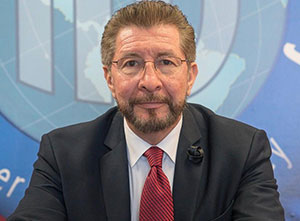Dictatorial constitutions violate human rights and produce misery

By: Carlos Sánchez Berzaín - 27/10/2025
Share:
The expansion of the Cuban dictatorship in Venezuela, Nicaragua, Bolivia, and Ecuador in the 21st century, in addition to the violence of its model of organized crime and state terrorism, has led to the institutional substitution of the republic and democracy by norms that violate human rights, grant indefinite control of power, enshrine impunity, and lead to misery. The pseudo-constitutionalism of 21st-century socialism is blatant proof of the dictatorial crimes that remain unpunished.
It is impossible to restore freedom and democracy without eliminating the laws of the dictatorship. To take power and maintain the dictatorial legal system of 21st-century socialism is to nominally take power but not actually hold power.
The criminal group formed by Hugo Chávez, Fidel Castro, and Lula da Silva was presented as populism, a popular insurgency, a fight against poverty, a need for change, and a revolutionary narrative, eventually controlling all of Latin America with the subordination and condescension of its victims: the democracies.
The Constitution, "the fundamental law of the state, with a higher rank than all other laws, defines the rights and freedoms of citizens and delimits the powers and institutions of the political organization," has been transformed into an instrument of domination, of the violation of rights and freedoms, of the concentration of power, and of manipulation to subjugate through state terrorism and impunity. This is evidenced by more than 66 years of Castroist disgrace in Cuba, more than 25 years of dictatorship in Venezuela, the second part of the dictatorship since 2007 in Nicaragua, more than 10 years of dictatorship under Correa in Ecuador, and more than two decades of dictatorship/narco-state in Bolivia.
A Political Constitution must, at a minimum, "guarantee rights, limit power, establish the legal order, and promote democracy." The Constitution "is the supreme law that must provide stability and predictability." It is the instrument that provides "security to the people by institutionalizing freedom as the foundation of political, social, and economic organization."
All of the so-called constitutions of 21st-century socialism imposed in Cuba, Venezuela, Bolivia, Nicaragua, and Ecuador ignore human rights such as the non-retroactivity of the law, the presumption of innocence, the prohibition of slavery and servitude, the right to personal liberty, due process of law, the rule of law, the protection of honor and dignity, freedom of thought and expression, the right to rectification and reply, the right of assembly, freedom of association, the right to nationality, the right to private property, the right of residence, equality before the law, judicial protection, and more. All of these rights are mandated in the Americas by the American Convention on Human Rights or Pact of San José.
In the economic sphere, they simply eliminate any possibility of free initiative, foreign investment, or transparency, because they are statist, centralist, and confiscatory. Under these conditions, combined with corruption and subservience to dictatorships outside the continent, the result is a steady slide toward poverty and misery for the people, while the criminal groups that hold power amass and launder vast fortunes.
Today we witnessed the extraordinary efforts of Ecuadorian President Daniel Noboa to end the narco-state established by Rafael Correa's dictatorship. However, the constitutional framework left behind by 21st-century socialism urgently requires reform to return to the principles of respect for human rights and the exercise of national sovereignty. Noboa holds the government but cannot exercise power, which remains substantially in the hands of organized crime disguised as politics.
The hope for change that accompanies Rodrigo Paz in Bolivia faces the possibility that the recently elected president will become the fourth leader of the plurinational narco-state of Bolivia or the president of the Republic of Bolivia. The only difference is whether he will assume power within the framework of the dictatorship's constitution or restore the republic and democracy, which means he will assume power from the grip of organized crime or take power to liberate Bolivians.
The same dilemma awaits Venezuela with the imminent fall of the Sole Cartel. The transition will either assume power within the framework of the dictatorship's power or restore the republic and democracy by ending the pseudo-legal system of organized crime, eliminating impunity and separating criminal groups from politics.
The difference between government and power is essential.
A transition must, at the very least, end the dictatorship's laws, prevent impunity, and remove organized crime parties, groups, and individuals from politics.
*Lawyer and Political Scientist. Director of the Interamerican Institute for Democracy
«The opinions published herein are the sole responsibility of its author».